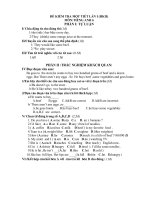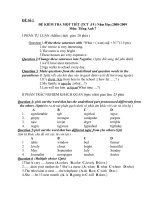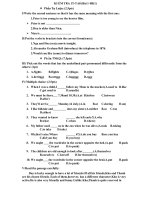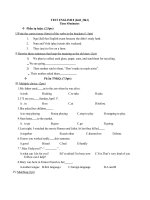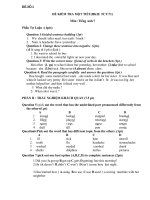Kiem tra 45''''- Tieng Anh 11- lan 2
Bạn đang xem bản rút gọn của tài liệu. Xem và tải ngay bản đầy đủ của tài liệu tại đây (53.15 KB, 4 trang )
Prepared by teacher: Thuy Dinh
Test on English Time: 45 minutes
Full name: ........................................................ No.2 Term: 1
Class: 11…… Nhu Thanh II High School. A
Choose the best answer (A, B, C or D) whose underlined part is pronouned differently from the
three others (1 mark)
1. A. volunteer B. honorable C. remote D. province
2. A. against B. struggle C. apologise D. game
3. A. agree B. eradicate C. advise D. voluntary
4. A. competition B. illiteracy C. handicapped D. fight
Read the following passage and decide whether the following statements are true or false. Cirle
T (true) or F (false). (2.5 marks)
Illiteracy Rate Around the World
It is estimated that 875 million adults are illiterate worldwide. Nearly two- thirds of them are women.
In 1969, the year man took his first step on the moon, 4 out of 5 women in Africa could not read or
write. It is estimated that today nearly half of all African women are still illiterate. More than 100 million
children, including at least 60 million girls, have no access to primary schooling.
Since 1985, there have been more female students enrolled in higher education than male students in
most industrialized countries. In contrast, in the world’s least developed countries, only 1 in 4 students of
higher education are women.
US studies considently show that all countries that have successfully reduced their population growth
rate have one factor in common- a higher female literacy rate.
In the world women represent 94% of pre-primary school teachers, 58% of primary school teachers and
48% of secondary school teachers.
In most developing countries on average, 33% of public spending on education benefits the richest fifth
of the population, while only 13% of education spending benefits the poorest fifth.
5. Nearly 600 million women are illiterate around the world. T F
6. In 1969, 80% of African women could read and write. T F
7. Of 100 million children who have no chance to go to school, at least 60 million are girls. T F
8. More female students enrolled in higher education in most industrialized countries than in least
developed countries. T F
9. There are more women around the world working in secondary education than in primary and pre-
primary school education. T F
Choose the best answer (A, B, C or D) which needs correcting (1 mark)
9. The policeman asked the man don’t to remove his hands from the car.
A B C D
10. The professor is thinking to go to the meeting on higher education next month.
A B C D
11. She smelt something burning and saw smoke rise.
A B C D
12. He congratulated me about having done the work very well.
A B C D
Choose the best answer (A, B, C or D) to fill in the blank (2 marks)
13. The fight against _______ still continues until everyone in society has known how to read and write.
A. wars B. literacy C. illiteracy D. illiterate
14. I’m looking forward to _____ on vacation.
A. go B. going C. be gone D. have gone
15. The law can’t prevent a person ______ spending his own money.
A. about B. with C. on D. from
16. “Let me take you to the station, Anna”, Mary said.
Mary offered _______ Anna to the station.
A. to taking B. to take C. taking D. take
17. Son La is a _______ province in the Northeast of Vietnam.
A. moutaineer B. mountain C. mountainous D. mountainy
18. “I must see the manager!”, he said. He insisted ________ the manager.
A. on seeing B. about seeing C. to see D. of seeing
19. To participate _______ the contest, you must complete two activities.
A. in B. at C. during D. with
20. They spend all their money ______ the poor and the sick.
A. help B. to help C. helping D. to helping
Choose the best answer (A, B, C or D) which is the correct combination of the given sentences.
(1.5 mark)
21. She hoped to find the lost book. She search ed everywhere.
A. Hoping to find the lost book, she search everywhere.
B. Hoped to find the lost book, she search everywhere.
C. Being hoped to find the lost book, she search everywhere.
D. Hopes to find the lost book, she search everywhere.
22. Because he had drunk too much, he didn’t drive home himself.
A. Had drunk too much, he didn’t drive home himself.
B. Drunk too much, he didn’t drive home himself.
C. Having drunk too much, he didn’t drive home himself.
D. To have drunk too much, he didn’t drive home himself.
23. “Can you tell me the way to the post office, please?,” he asked a passed- by.
A. He asked a passed- by if could tell him the way to the post office.
B. He asked a passed- by to tell him the way to the post office.
C. He asked a passed- by tell him the way to the post office.
D. He asked a passed – by telling him the way to the post office.
Complete the second sentence so that it has the same meaning as the first. (2 marks)
24. “Keep out of this room at all times,’ she said to them.
She warned ______________________________________________________________________
25. “You need to study harder, ” the teacher said to him.
The teacher advised _______________________________________________________________
26. “I am sorry I didn’t tell you about my fight earlier,” Linda said.
Linda apologised __________________________________________________________________
27. “You have taken my car, Peter” said Jane.
Jane accused _____________________________________________________________________
Prepared by teacher: Thuy Dinh
Test on English Time: 45 minutes
Full name: ........................................................ No.2 Term: 1
Class: 11…… Nhu Thanh II High School. B
Choose the best answer (A, B, C or D) which needs correcting (1 mark)
1. She smelt something burning and saw smoke rise.
A B C D
2. The professor is thinking to go to the meeting on higher education next month.
A B C D
3. The policeman asked the man don’t to remove his hands from the car.
A B C D
4. He congratulated me about having done the work very well.
A B C D
Choose the best answer (A, B, C or D) which is the correct combination of the given sentences.
(1.5 mark)
5. Because he had drunk too much, he didn’t drive home himself.
A. Had drunk too much, he didn’t drive home himself.
B. Drunk too much, he didn’t drive home himself.
C. Having drunk too much, he didn’t drive home himself.
D. To have drunk too much, he didn’t drive home himself.
6. She hoped to find the lost book. She search ed everywhere.
A. Hoping to find the lost book, she search everywhere.
B. Hoped to find the lost book, she search everywhere.
C. Being hoped to find the lost book, she search everywhere.
D. Hopes to find the lost book, she search everywhere.
7. “Can you tell me the way to the post office, please?,” he asked a passed- by.
A. He asked a passed- by if could tell him the way to the post office.
B. He asked a passed- by to tell him the way to the post office.
C. He asked a passed- by tell him the way to the post office.
D. He asked a passed – by telling him the way to the post office.
Choose the best answer (A, B, C or D) whose underlined part is pronouned differently from the three
others (1 mark)
8. A. agree B. eradicate C. advise D. voluntary
9. A. against B. struggle C. apologise D. game
10. A. volunteer B. honorable C. remote D. province
11. A. competition B. illiteracy C. handicapped D. fight
Complete the second sentence so that it has the same meaning as the first. (2 marks)
12. “I am sorry I didn’t tell you about my fight earlier,” Linda said.
Linda apologised __________________________________________________________________
13. “You have taken my car, Peter” said Jane.
Jane accused _____________________________________________________________________
14. “Keep out of this room at all times,’ she said to them.
She warned ______________________________________________________________________
15. “You need to study harder, ” the teacher said to him.
The teacher advised _______________________________________________________________
Choose the best answer (A, B, C or D) to fill in the blank (2 marks)
16. To participate _______ the contest, you must complete two activities.
A. in B. at C. during D. with
17. The fight against _______ still continues until everyone in society has known how to read and write.
A. wars B. literacy C. illiteracy D. illiterate
18. “I must see the manager!”, he said. He insisted ________ the manager.
A. on seeing B. about seeing C. to see D. of seeing
19. I’m looking forward to _____ on vacation.
A. go B. going C. be gone D. have gone
20. “Let me take you to the station, Anna”, Mary said.
Mary offered _______ Anna to the station.
A. to taking B. to take C. taking D. take
21. Son La is a _______ province in the Northeast of Vietnam.
A. moutaineer B. mountain C. mountainous D. mountainy
22. They spend all their money ______ the poor and the sick.
A. help B. to help C. helping D. to helping
23. The law can’t prevent a person ______ spending his own money.
A. about B. with C. on D. from
Read the following passage and decide whether the following statements are true or false. Cirle
T (true) or F (false). (2.5 marks)
Illiteracy Rate Around the World
It is estimated that 875 million adults are illiterate worldwide. Nearly two- thirds of them are women.
In 1969, the year man took his first step on the moon, 4 out of 5 women in Africa could not read or
write. It is estimated that today nearly half of all African women are still illiterate. More than 100 million
children, including at least 60 million girls, have no access to primary schooling.
Since 1985, there have been more female students enrolled in higher education than male students in
most industrialized countries. In contrast, in the world’s least developed countries, only 1 in 4 students of
higher education are women.
US studies considently show that all countries that have successfully reduced their population growth
rate have one factor in common- a higher female literacy rate.
In the world women represent 94% of pre-primary school teachers, 58% of primary school teachers and
48% of secondary school teachers.
In most developing countries on average, 33% of public spending on education benefits the richest fifth
of the population, while only 13% of education spending benefits the poorest fifth.
24. Nearly 600 million women are illiterate around the world. T F
25. In 1969, 80% of African women could read and write. T F
26. Of 100 million children who have no chance to go to school, at least 60 million are girls. T F
27. More female students enrolled in higher education in most industrialized countries than in least
developed countries. T F
28. There are more women around the world working in secondary education than in primary and pre-
primary school education. T F
